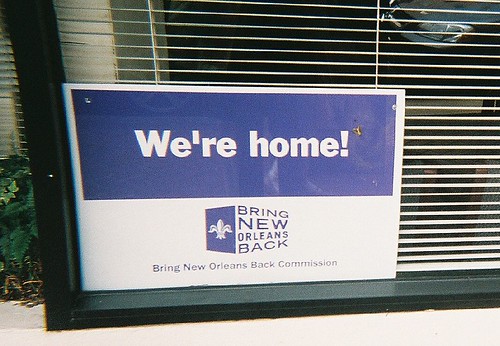
70. Nine Lives: Death and Life in New Orleans, by Dan Baum
New Orleans. There's no other city like it in the United States. It's southern, it's French, it's Spanish, it's African-American. It's the filé in the gumbo, the lait in the café, the feathers of the Mardi Gras Indians and the improvisation of a jazz ensemble.
And we nearly lost it. We nearly lost it all.
A lot of books have been written about Hurricane Katrina. I've read a bunch of them. This is one of the best, mostly because it's not merely about Katrina. After I came back from the Jazz and Heritage Festival in 2006, I wrote in my Live Journal: I picked up a book while I was there, Chris Rose's 1 Dead in Attic, a collection of his articles in the Times-Picayune. And in the eponymous article he writes about some homes in the Eighth Ward, where many of the Mardi Gras Indians live, and where they have "retrieved their tattered and muddy Indian suits and sequins and feathers and they have nailed them to the fronts of their houses." New Orleans has nailed its colors to its houses; it's not going without a fight.
This is Baum's effort to understand and explain, through the lives of nine New Orleanians, just what it is that makes people so devoted to this city, as poor and violent and corrupt as it was, just why they struggled (and still struggle) so hard to return and rebuild. He interviewed these folks (as well as friends, relatives and co-workers) for days, you feel that he knows them as well as he knows himself.
His interviewees are as varied as you'd expect: a high school band leader, a transsexual bar owner, the coroner of Orleans Parish, a single mom from the 'hood determined to have a better life, a millionaire king of carnival, the wife (later widow) of Big Chief Tootie Montana. Their lives are so different, and yet they intersect. Each in his or her own way has tried in their lives to make their city a better place. It hasn't always been easy. Wilbert Rawlins, Jr.'s devotion to his band kids, knowing that for many he's the only father, for some the only parent, that they know, nearly loses him the woman he loves. Billy Grace, Rex, King of Carnival, risks losing status to open up the krewes (those social organizations that drive Mardi Gras). Ronald Lewis fights for equal rights on the job, and starts a second-line club to "bring a little pride back" to the Lower Ninth. Setbacks don't stop them, so why should Katrina?
Rather than tell one person's story and then the next, Baum has told the stories in bits and pieces, chronologically, beginning in 1965, with Hurricane Betsy (described by Lewis as "a force of nature more powerful than his mom") and ending two years after Katrina. This structure gives the book such great force and drive that I finished it at about 1:00 in the morning, unwilling (unable, really) to stop reading. There's an incredible tension in reading the dates under each section, as we move closer and closer to that weekend in 2005.
When jazz great Irvin Mayfield was interviewed by NPR shortly after Katrina, he said "jazz is about taking what you have and making the best of it, and doing it with style". That's what these folks did with their lives, and are still doing to make New Orleans come alive again.

Interesting! I didn't know there were many books written about Hurricane Katrina. I guess I figure since it wasn't that long ago, how could people find time to write a book about it? haha... if I were writing a book it would take me forever. :P Why are you so interested in New Orleans? Do you just enjoy visiting it? I visited it several months before Katrina hit... it was interesting, but I have liked other cities far more than I liked it (Chicago, San Diego, and Denver have been my favourites in all of my travels haha). :)
ReplyDelete-Jesse
I've loved New Orleans since the very first time I visited it, years ago. It's got the best music, the best food. The people are wonderful, the architecture is great, I just love it to pieces.
ReplyDeleteGlad to hear you like Chicago - that's where I live!